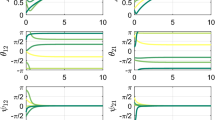Abstract
Perceptual Grouping is an important aspect in the understanding of sensory input. One of the major problems there is, how features can form meaningful groups while segregating from non relevant informations. One solution can be to couple features by attracting and repelling interactions and let neural dynamics decide the assignment of features to groups. In this paper, we present a modification of a learning approach to find these couplings, which explicitly incorporates the information gain of feature pairs, increasing the overall grouping quality of the original technique. The new approach is evaluated with an oscillator network and compared to the original work.
Access this chapter
Tax calculation will be finalised at checkout
Purchases are for personal use only
Preview
Unable to display preview. Download preview PDF.
Similar content being viewed by others
References
Heidemann, G., Ritter, H.: Efficient vector quantization using the wta-rule with activity equalization. Neural Processing Letters 13(1), 17–30 (2001)
Kuramoto, Y.: Chemical oscillations, waves, and turbulence. Dover (2003)
Meier, M., Haschke, R., Ritter, H.: Perceptual grouping through competition in coupled oscillator networks. In: ESANN (2013)
Rao, S., Han, S., Principe, J.: Information theoretic vector quantization with fixed point updates. In: International Joint Conference on Neural Networks, IJCNN 2007, pp. 1020–1024 (August 2007)
Rényi, A.: Some fundamental questions of information theory. Selected Papers of Alfred Renyi 2(174), 526–552 (1976)
Ritter, H.: A spatial approach to feature linking. In: INNC (1990)
Treisman, A., et al.: The binding problem. Current Opinion in Neurobiology 6(2), 171–178 (1996)
Weng, S., Wersing, H., Steil, J., Ritter, H.: Learning lateral interactions for feature binding and sensory segmentation from prototypic basis interactions. IEEE Transactions on Neural Networks 17(4), 843–862 (2006)
Wersing, H., Steil, J., Ritter, H.: A competitive-layer model for feature binding and sensory segmentation. Neural Computation 13(2), 357–387 (2001)
Author information
Authors and Affiliations
Editor information
Editors and Affiliations
Rights and permissions
Copyright information
© 2013 Springer-Verlag Berlin Heidelberg
About this paper
Cite this paper
Meier, M., Haschke, R., Ritter, H.J. (2013). Learning of Lateral Interactions for Perceptual Grouping Employing Information Gain. In: Mladenov, V., Koprinkova-Hristova, P., Palm, G., Villa, A.E.P., Appollini, B., Kasabov, N. (eds) Artificial Neural Networks and Machine Learning – ICANN 2013. ICANN 2013. Lecture Notes in Computer Science, vol 8131. Springer, Berlin, Heidelberg. https://doi.org/10.1007/978-3-642-40728-4_23
Download citation
DOI: https://doi.org/10.1007/978-3-642-40728-4_23
Publisher Name: Springer, Berlin, Heidelberg
Print ISBN: 978-3-642-40727-7
Online ISBN: 978-3-642-40728-4
eBook Packages: Computer ScienceComputer Science (R0)




